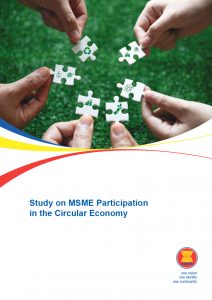📘 Study on MSME Participation in the Circular Economy
Unlocking Opportunities for a Greener, More Inclusive ASEAN Economy
As ASEAN Member States (AMS) advance toward more sustainable and resilient economies, the circular economy (CE) has emerged as a central pillar of regional development strategies—closely aligned with the ASEAN Framework for Circular Economy for the ASEAN Economic Community (AEC). While progress across the region is uneven, with some AMS setting clear targets and roadmaps while others remain in early adoption phases, one common thread persists: the pivotal role of micro, small and medium enterprises (MSMEs).
MSMEs are the backbone of ASEAN’s economy, yet many face significant barriers to adopting CE practices. Despite growing awareness—only 57% of ASEAN MSMEs are familiar with the concept of CE—technical, financial, and regulatory challenges continue to hinder deeper engagement. The most active sectors include food and beverage, agriculture, retail, fashion, and creative industries, where digitalisation, energy efficiency, and material optimisation are the most widely adopted practices.
This regional study reveals a pressing need for targeted policies and support systems to help MSMEs transition to circular business models. These include specialised training, legal and technical assistance, access to certification, and sustainable financing mechanisms. The findings validate and reinforce the Policy Recommendations on Enhancing ASEAN MSMEs’ Participation in Circular Economy, endorsed during the 16th ACCMSME meeting in 2023, and highlight the need for enhanced collaboration in advocacy, capacity-building, and digital tools.
The report also outlines actionable strategies to address persistent gaps:
-
Standardising definitions and criteria for CE-compliant MSMEs
-
Developing practical training modules and regional expert guidelines
-
Establishing regulatory sandboxes and matchmaking platforms
-
Promoting consumer awareness and sustainable consumption
-
Supporting access to markets through green procurement and eco-labelling
With rising global demand for green products and platforms like ASEAN Access and the ASEAN Circular Economy Stakeholder Platform (ACESP) providing crucial support, now is the time to scale MSME participation in the circular economy. This study sets the stage for coordinated action—helping policymakers, business leaders, and development partners design interventions that build a thriving, sustainable, and inclusive circular economy in ASEAN.


